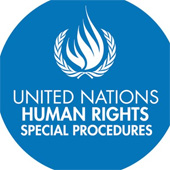
UN expert assessed human rights of LGBT persons in Georgia
By Mariam Chanishvili
Monday, October 8
The United Nations (UN) Independent Expert on the protection against violence and discrimination based on sexual orientation and gender identity, Victor Madrigal-Borloz, shared preliminary findings of his visit to Georgia at a press conference on Friday at UN House in Tbilisi.
His official visit to Georgia was conducted from 25 September to 5 October 2018.
“The visit provides an important opportunity to assess the implementation of the existing national and international human rights standards to combat violence and discrimination against lesbian, gay, bisexual, and transgender (LGBT) people in the country,” said Madrigal-Borloz.
Madrigal-Borloz will have a chance to present his findings and recommendations to the UN Human Rights Council in June 2019.
The expert, who was mandated by the UN Human Rights Council, traveled to Tbilisi, Kutaisi and Batumi met local authorities, religious leaders, the Public Defender’s Office, representatives of the government, members of the international community, etc.
Exploring factors impacting on the vulnerability and the risk of exclusion and marginalization of LGBT persons and the root causes of violence and discrimination was among the main goals of the expert.
He noted that beatings were commonplace, as well as harassments, bullying and exclusion from families.
“The majority of gay, lesbian, bisexual or transgender people in Georgia face dilemma- leaving the country or staying and taking one of the two paths: revealing their true identity and be subjected to certain violence and discrimination, or concealing this essential aspect of their identity and living in a world of deception,” Madrigal-Borloz said.
He mentioned that the Georgian Government has taken significant steps to address the situation of LGBT people.
“I am convinced that respect, peaceful coexistence and tolerance are cherished Georgian values and I am certain that they will provide a foundation where all Georgians who happen to be gay, lesbian, trans or bisexual will live free and equal,” he said.
At the end of his statement, he made various suggestions to the state, including - “state take immediate measures to improve the health and well-being of LGBT people and guarantee their access to good quality healthcare services and health-related information.”
The Independent Experts are part of what is known as the Special Procedures of the Human Rights Council. Special Procedures, the largest body of independent experts in the UN Human Rights system, is the general name of the Council’s independent fact-finding and monitoring mechanisms that address either specific country situations or relevant issues for all parts of the world.

